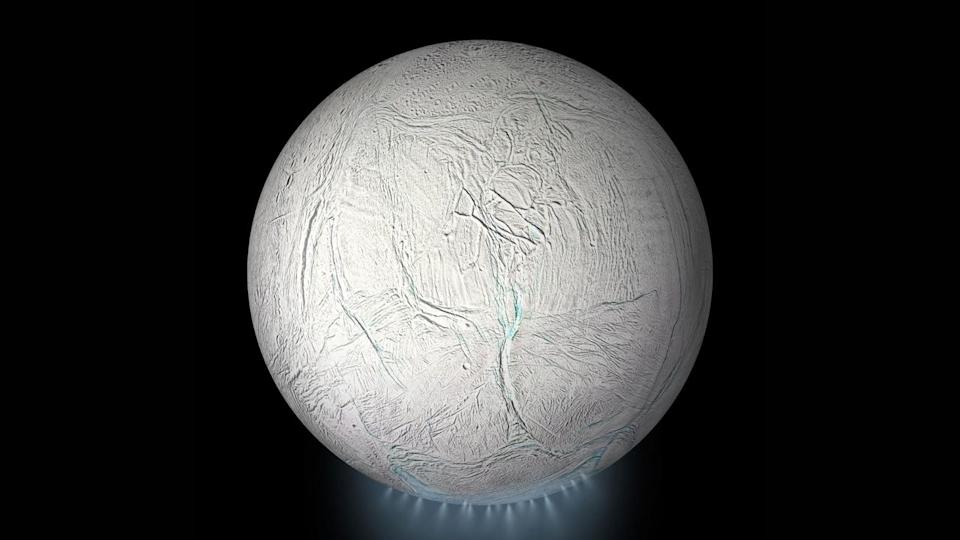
News
September 28, 2025
Europe wants to launch a life-hunting mission to Saturn's icy ocean moon Enceladus
The European Space Agency aims to develop an orbiter-lander mission that will sample the icy plumes of Saturn's icy ocean moon Enceladus and search for signs...
Europe is setting its sights on a bold new mission: hunting for life on Enceladus, one of Saturn's most intriguing moons. The European Space Agency (ESA) is currently exploring the development of an ambitious orbiter-lander mission designed to delve into the mysteries of this icy world and, most importantly, search for signs of life.
Enceladus has captured the attention of scientists worldwide thanks to the discovery of plumes of water vapor and icy particles erupting from its south pole. These plumes are believed to originate from a subsurface ocean, a vast body of liquid water hidden beneath the moon's icy shell. This ocean, kept liquid by tidal forces generated by Saturn's gravity, makes Enceladus a prime candidate in the search for extraterrestrial life within our solar system.
The proposed ESA mission envisions a two-pronged approach. An orbiter would initially study Enceladus from afar, mapping its surface, analyzing the composition of the plumes, and identifying potential landing sites. Following this orbital reconnaissance, a lander would descend to the surface, specifically targeting areas where the plumes are most active.
The lander's primary objective would be to collect and analyze samples from the icy plumes. It would be equipped with sophisticated instruments capable of detecting a wide range of organic molecules, the building blocks of life. The mission aims to determine if the ocean contains the chemical ingredients and energy sources necessary to support living organisms.
This mission is not without its challenges. Enceladus is located far from Earth, presenting significant engineering hurdles for spacecraft design, communication, and power generation. The lander would need to withstand the harsh environment of space and the frigid temperatures on the surface of Enceladus. Furthermore, ensuring the pristine nature of the samples collected, preventing any contamination from Earth-based microbes, is of utmost importance.
Despite these challenges, the potential scientific rewards are immense. Finding evidence of life on Enceladus would revolutionize our understanding of biology and our place in the universe. It would demonstrate that life can arise in environments drastically different from Earth, expanding the range of habitable zones and increasing the likelihood of finding life elsewhere in the cosmos. The mission represents a significant step in humanity's quest to answer one of the most fundamental questions: are we alone? The mission is still in its early planning stages, but the ambition and potential impact are clear.
Enceladus has captured the attention of scientists worldwide thanks to the discovery of plumes of water vapor and icy particles erupting from its south pole. These plumes are believed to originate from a subsurface ocean, a vast body of liquid water hidden beneath the moon's icy shell. This ocean, kept liquid by tidal forces generated by Saturn's gravity, makes Enceladus a prime candidate in the search for extraterrestrial life within our solar system.
The proposed ESA mission envisions a two-pronged approach. An orbiter would initially study Enceladus from afar, mapping its surface, analyzing the composition of the plumes, and identifying potential landing sites. Following this orbital reconnaissance, a lander would descend to the surface, specifically targeting areas where the plumes are most active.
The lander's primary objective would be to collect and analyze samples from the icy plumes. It would be equipped with sophisticated instruments capable of detecting a wide range of organic molecules, the building blocks of life. The mission aims to determine if the ocean contains the chemical ingredients and energy sources necessary to support living organisms.
This mission is not without its challenges. Enceladus is located far from Earth, presenting significant engineering hurdles for spacecraft design, communication, and power generation. The lander would need to withstand the harsh environment of space and the frigid temperatures on the surface of Enceladus. Furthermore, ensuring the pristine nature of the samples collected, preventing any contamination from Earth-based microbes, is of utmost importance.
Despite these challenges, the potential scientific rewards are immense. Finding evidence of life on Enceladus would revolutionize our understanding of biology and our place in the universe. It would demonstrate that life can arise in environments drastically different from Earth, expanding the range of habitable zones and increasing the likelihood of finding life elsewhere in the cosmos. The mission represents a significant step in humanity's quest to answer one of the most fundamental questions: are we alone? The mission is still in its early planning stages, but the ambition and potential impact are clear.
Category:
Technology